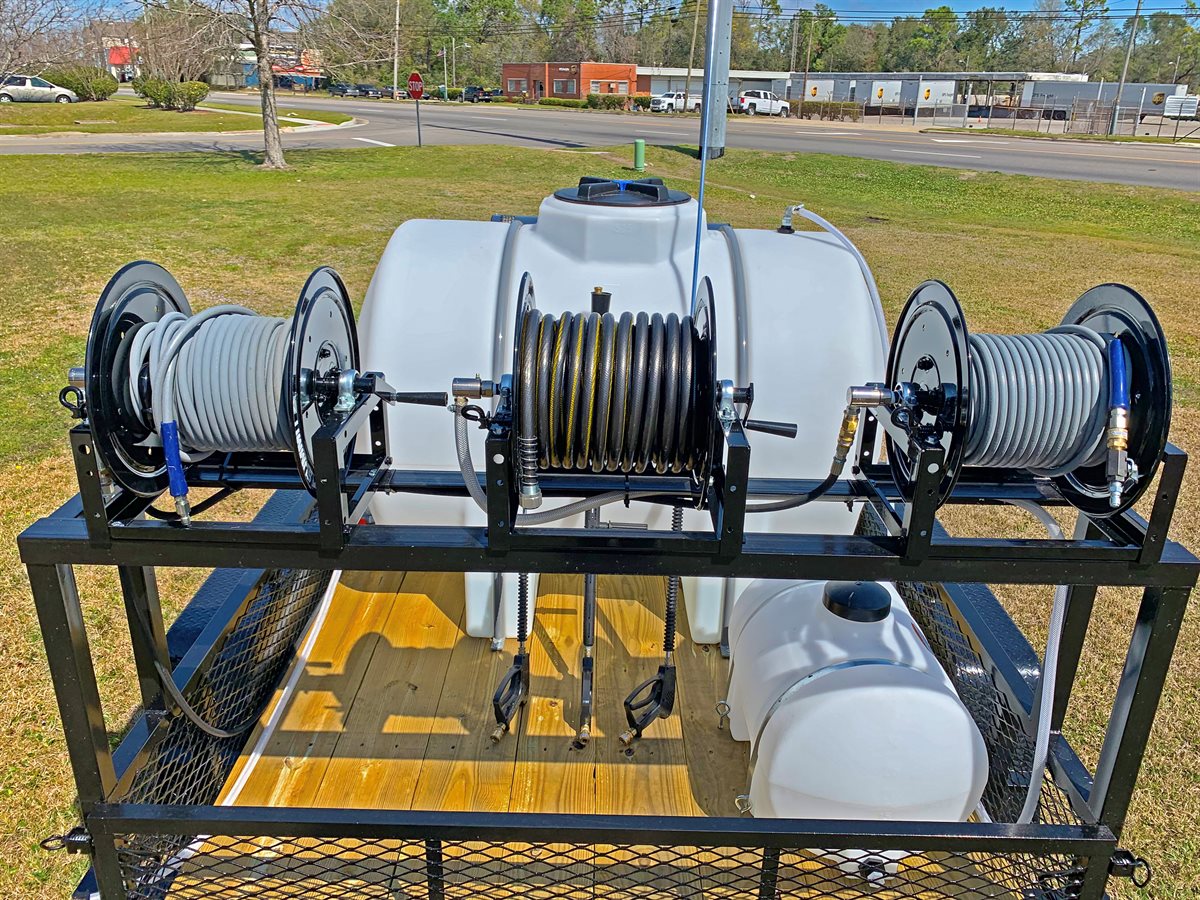How Much Water Do You Need for Pressure Washing?
July 15, 2025

If you're starting a pressure washing business or looking to upgrade your trailer setup, choosing the right water tank size is one of the most important decisions you’ll make. Too small, and you'll be stuck refilling mid-job. Too large, and you might be hauling around unnecessary weight that slows you down and strains your trailer.
Whether you're tackling residential driveways or full-scale commercial contracts, this guide will help you understand how much water you actually need, how to calculate it based on your equipment, and what tank size best fits your workflow. We'll also go over real-world examples and key factors like weight, flow rate, and job type so you can build out the perfect rig for your business.
Understanding GPM and Water Usage
Before you decide on a tank size, you need to understand GPM, or gallons per minute. That’s how much water your pressure washer uses when the trigger is pulled. A 4 GPM washer uses four gallons every minute. That adds up fast.
To estimate how much water you’ll need:
Water Needed (gallons) = GPM × Time (minutes)
If you’re using a 4 GPM machine and plan to spray for 30 minutes, you’ll need roughly 120 gallons of water. An 8 GPM machine running for the same time will need 240 gallons.
Keep in mind that you’re rarely spraying the entire time. Pauses between work zones or during setup will stretch your tank capacity. But it’s better to plan conservatively, especially if you won’t have access to a hose for refilling.
For a more in-depth look at how flow rate impacts water usage, check out our blog on
How Much Water Does My Pressure Washer Use?
Water Tank Sizes by Job Type
Choosing the right tank size depends heavily on the kind of work you do and whether you can refill on site. Here’s a helpful breakdown.
Water Tank Size Comparison Table
|
Job Type |
Typical Tank Size |
Use Case |
|
Residential (driveways, siding, patios) |
50–100 gallons |
Use as a buffer tank with on-site water |
|
Light Commercial (restaurants, sidewalks, roofs) |
100–200 gallons |
Use for short jobs or multiple stops with refill access |
|
Heavy Commercial (parking lots, warehouses) |
225–500 gallons |
Ideal when on-site water is unavailable or limited |
|
Fleet Washing (vehicles, equipment yards) |
100–300 gallons |
Wash multiple vehicles in one session |
Buffer Tanks vs Full Tanks
If you're working mostly in residential areas where a water hookup is available, you might only need a small tank that acts as a buffer. A buffer tank ensures steady water flow to your pressure washer even if the client's spigot fluctuates or can't keep up.
In this case, a 50 to 125-gallon tank is more than enough. You’ll fill the tank from the hose, then draw from it as you spray. This also protects your pump from running dry.
But if you’re cleaning remote properties or areas without a water source, you’ll need to bring everything with you. That means sizing your tank to carry the full volume you’ll use during the job. This is where larger 225 to 500-gallon tanks come in handy.
Weight Considerations
Water is heavy. One gallon weighs about 8.34 pounds, so even a 200-gallon tank adds over 1,600 pounds to your trailer. Here’s a quick breakdown:
-
100 gallons = 834 pounds
-
200 gallons = 1,668 pounds
-
300 gallons = 2,502 pounds
-
500 gallons = 4,170 pounds
When you add your trailer, pressure washer, hose reels, tools, and everything else, you can easily exceed the weight capacity of a single-axle trailer. For any tank over 200 gallons, we highly recommend a dual-axle trailer like the Super Mud Dog or Beast Trailer , which are built for heavier loads.
Don’t forget—some states require trailer brakes if you're hauling more than a certain weight. Even if it’s not legally required in your state, trailer brakes are a smart safety upgrade once you go over 1,500 pounds.
Real-World Recommendations
From speaking with professionals and reviewing setups from the field, here are a few practical guidelines:
-
Residential only? Go with a 100-gallon tank and plan to connect to customer water.
-
4–6 GPM washer with light commercial work? 125–225 gallons is ideal.
-
8 GPM washer or multiple machines? Look at 300+ gallons, especially if water access is limited.
-
Remote job sites or large commercial contracts? Plan for 400+ gallons and a dual-axle trailer.
Doug Rucker, a seasoned pressure washing pro, considers 225 gallons a “sweet spot” for most commercial jobs—enough capacity without overloading your rig.
Choose the Right Trailer for Your Tank
Mud Dog Trailers offers a full range of pressure washing trailers with tank sizes that match every level of business:
-
The Mud Puppy : Compact setup with a 225-gallon tank, perfect for solo operators and residential jobs.
-
The Standard Mud Dog : Equipped with a 525-gallon tank for light commercial and residential work.
-
The Diesel Dog : Hot water system and up to 525 gallons for heavy-duty commercial or industrial work.
-
The Beast Trailer : Carries up to 1000 gallons with dual axles for major jobs and large-scale operations.
Not sure which trailer fits your business best? We’re here to help. Contact us today and we’ll help you build the right mobile setup based on your flow rate, job types, and budget.

